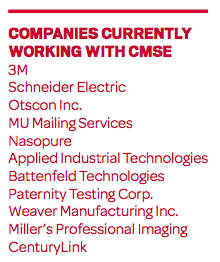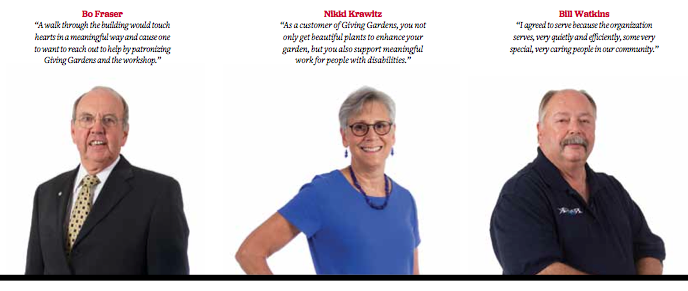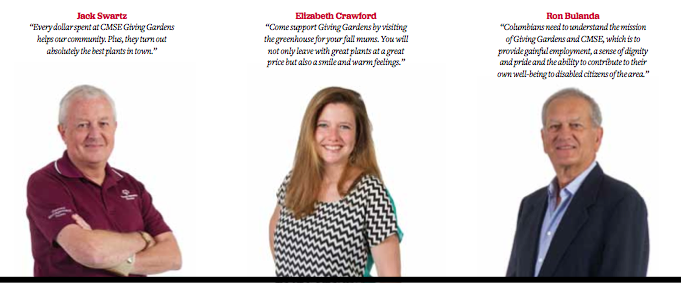Giving Gardens provides fair work, fresh air
 In 2009, Central Missouri Subcontracting Enterprises was facing a financial and existential crisis. After losing a big contract, Executive Director Bruce Young was afraid he was going to have to lay off some employees. But retired horticulturist Bill Regan proposed Young start an independent greenhouse to add to CMSE’s network of contracting work.
In 2009, Central Missouri Subcontracting Enterprises was facing a financial and existential crisis. After losing a big contract, Executive Director Bruce Young was afraid he was going to have to lay off some employees. But retired horticulturist Bill Regan proposed Young start an independent greenhouse to add to CMSE’s network of contracting work.
Young was unsure at first. CMSE operates as a subcontracting service that provides people with physical or mental disabilities opportunities to work and be fairly compensated. He wasn’t sure if his employees would be able to operate and work safely and comfortably in a greenhouse as they had been in a manufacturing role.
“We got a lot of folks back there that can’t even count to five consistently,” Young says, “so finding work for those folks has been incredibly more difficult as time has gone on.”
But Young did some research and found that other subcontractors that employed people with disabilities had installed greenhouses and found some success. So he took Regan up on his proposal, and Giving Gardens had full greenhouses by spring of 2010.
Providing gainful employment
For five years, Giving Gardens has been growing and strengthening its customer base while giving anywhere from five to 25 CMSE employees the chance to work outside in the greenhouses, depending on the season. Young says Giving Gardens offers a welcome change of pace for the company’s 130 employees.
“We have 130 people who want to come out here and work,” Young says. “Not everybody can, so we try to get as many people that want to and switch them around.”
Tammy Cundiff is one of Giving Gardens’ greenhouse managers. She has been with the company since its first selling season in spring of 2010. She came into the job with years of horticulture experience but virtually zero experience in working with people with disabilities, and she says working with them has been a revelation.
“I think I probably learn more from them than they learn from me,” Cundiff says. “You couldn’t ask for a group of people that are willing to work harder and be so patient and so kind.”
For CMSE’s 130 employees, the options for gainful employment are severely limited. CMSE provides them with a chance to earn a salary without having to work in a less welcoming environment. Although some employment services allow people with disabilities to fall through the cracks, CMSE works with Columbia Public Schools to make sure students will have a fair opportunity to earn money once they graduate high school.
“It’s not healthy to sit at home and do nothing,” Young says. “Our ultimate goal is to work with folks, and, if they aren’t able to work in competitive employment, to provide them with job opportunities so they can learn how to sit and work and be productive.”
‘They come back every day’
Despite the extra effort Young and CMSE put forth to help people with disabilities get work, and despite the company’s qualification as a 501(c)(3) nonprofit organization, Young insists the company works like a regular business. The majority of CMSE’s income comes from the services it provides, and employees are paid hourly at a rate that combines the value of the job an employee performs with the employee’s capacity to perform that job. If, for example, an employee were doing work that merits $10 per hour but is performing at 85 percent of what a person without a disability would do, then that employee earns $8.50 an hour.
Young says that oftentimes, employees who are able to work in competitive employment will return to CMSE for a number of reasons. Working an entry-level job usually means people with disabilities get worse shifts and fewer opportunities to earn money. They also can get bullied and teased by other employees, which is something Young says they’ve been dealing with their whole lives.
“We encourage our folks to move on in to competitive employment,” Young says. “But I’ve got some folks that have no desire to do that. Actually, they’re making more money here than they would at an entry-level job anyway.”
Young says Giving Gardens has helped his employees in other ways beyond earning a wage and getting a chance to work outside. He says getting out of the noisy, highly stimulating warehouse, especially for some of the employees with autism, provides a healthy tranquility.
“We have found that working in the greenhouse, transplanting and planting and watering, it’s very therapeutic,” Young says. “And we’ve seen dramatic changes in some of those folks because of that transition.”
Cundiff says Giving Gardens is continuing to find its niche and grow specific types of plants and arrangements, such as chrysanthemums, gazanias and hanging baskets that have become the greenhouse’s specialty. But she says the thing that helps the most is how hard her employees work for her.
“The work ethic is so good,” Cundiff says. “Our job is dirty, it’s sweaty, it’s hard some days, and it’s carrying a lot of stuff. I’ve been in job situations where a lot of young people would have never stayed with us. They would have quit. And they don’t here. They come back every day.”




